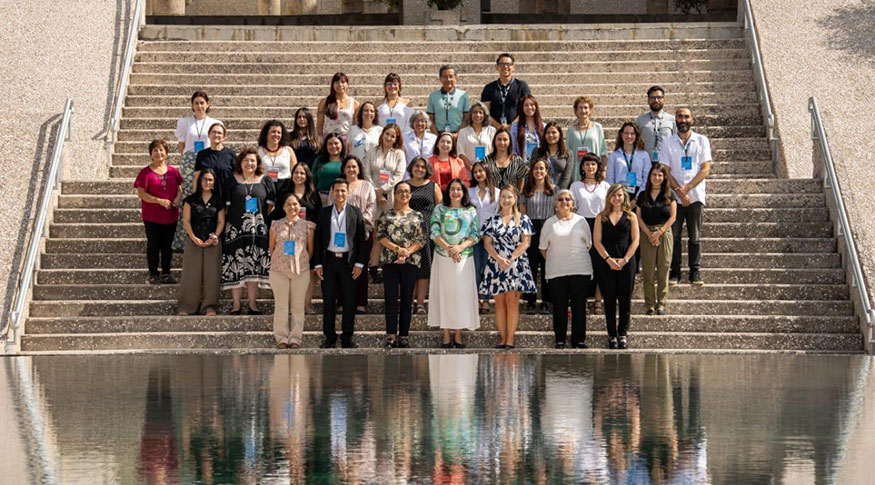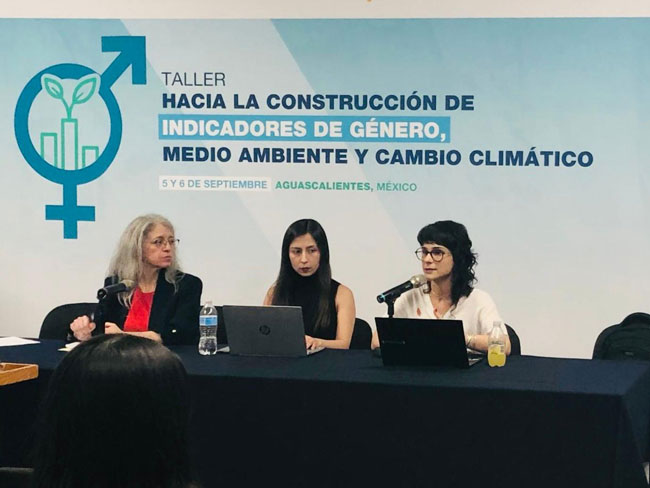Gender Commission
IBGE Gender Commission participates in regional workshop promoted by UN Women
September 16, 2024 03h37 PM | Last Updated: September 19, 2024 07h32 PM

On September 5 and 6, researcher Maria Luisa Pimenta, Environment Department assistant and representative of the Thematic Commission for Social Gender Relations and Sexuality of the Brazilian Institute of Geography and Statistics (IBGE), participated in the workshop “Perspectives for the construction of gender, environment and climate change indicators”. Promoted by UN Women within a regional Project, with the objective of identifying advances and challenges in the production of gender and environment indicators, the workshop was held at the headquarters of the national Institute of Statistics and Geography of Mexico (INEGI), in Aguascalientes, no Mexico.
With the topic “Gender, Environment and Climate Change: promoting efficient, fair and effective actions”, the regional project was attended by representatives from Latin America and the Caribbean, and discussed the role of women in decision-making on the climate change agenda, emphasizing the importance of the gender perspective in implementing actions to ensure that the benefits of sustainable development are equally available to everyone in the region.
The workshop was attended by experts in environment and gender statistics, who shared experiences on structuring information systems in the countries, promoting integration for the development, the use and the analysis of data that highlight the environmental risks faced by the population, in a distinctive way between men and women. The meeting represents a step towards strengthening the construction of data from a gender perspective to face the challenges of climate change.

In her presentation, Maria Luisa reflected on the development of climate change indicators with a gender focus, highlighting the results of the 2022 Population Census and other environmental data for the systematization of the Global Set of Climate Change Statistics and Indicators developed by the UN Statistics Division. She also commented on the installation of the Thematic Commission at the IBGE and the challenges the Institute faces in building representative gender statistics.
“During this meeting with other representatives of statistics institutes and environment ministries, I realized that other Latin American and Caribbean countries have similar challenges to ours in terms of producing official information and inter-institutional coordination, and that this is more evident in cross-cutting agendas such as climate change and gender. Mexico has an inspiring experience for us, through the creation of the SNIEG (National System of Statistical and Geographical Information) and we hope that this relationship will contribute to the reflection we are having at the IBGE on a renewed system of statistics and geoinformation that the country needs,” the researcher said.
The event presented models of how other countries in the region organize their information systems, their policies for inclusion and their thematic priorities. The participation of the IBGE boosts the generation of data that make visible the inequalities that women face, contributing to the creation of indicators that allow informed decision-making, reducing gender inequalities.
About the project discussions
Entitled “Gender, Environment and Climate Change: promoting efficient, fair and effective actions”, the regional project is based on the concerns of the spaces of women in decision-making on the climate change agenda.
The issue has been discussed since the United Nations Climate Change Conference (COP25) in 2019, where countries recognized the need to monitor the Paris Agreement in a cross-cutting way. In nations that have already signed the Agreement, there is a lack of structured databases preventing monitoring from being systematically carried out.
The discussions are based on data that already exist. For example, in terms of time-use, it is known that women spend 2.8 hours more per day than men on unpaid domestic and care work. The estimate comes from the report organized by UN Women as part of its monitoring of the indicators of SDG 5, Gender Equality. According to the analysis in the report, in these situations, the effects are mostly on women and young girls, who have more responsibility for organizing domestic tasks and households (a type of unpaid care).
Having greater visibility and evaluation through gender-disaggregated statistics can highlight existing inequalities and disparities, in order to reflect on more effective public policies and actions based on evidence.




















